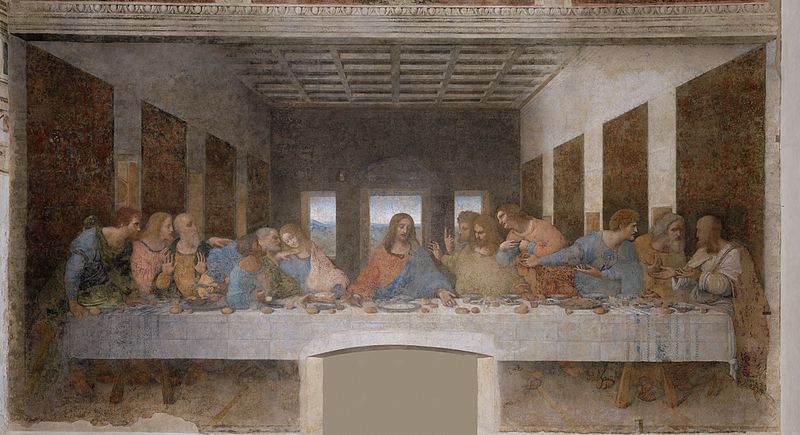
Última Cena, Leonard Da Vinci
Last year at Thanksgiving, I shared with Catholic Sistas my love for the Scripture of John 6, and how clearly the Holy Spirit teaches us about Christ’s Real Presence in the Eucharist. As I am always learning, this year has brought me even closer to the Eucharist, in ways I didn’t see coming. Today, I wish to share something that has revolutionized my faith.
I live in the Bible Belt of Texas, and thus I have become greatly influenced by our Sola-Scriptura brothers and sisters in Christ that the Bible is to be paramount in the life of a follower of Christ. After all, reading Sacred Scripture is reading the very words of the Holy Spirit Himself, so a Christian seeking clarity naturally turns the pages of the Bible.
When focusing on the issue of Authority in my Catholic Apologetics hobby, I’ve often ruminated on the fact that Christ never penned any Sacred Scripture. He could have, He was fully human, and He knew there would be Scriptures of the New Testament, so why not contribute? During the Gospel reading at each mass, we could be reading from the Gospel of Jesus in addition to ( or even instead of) Matthew, Mark, Luke and John, and that would be pretty awesome. But, no, God saw it fit, in His perfect plan for our Salvation, that the Holy Spirit work only through ordinary men to leave us His Written Word, and this is as it should be. I have also ruminated much on Christ’s Ascension, and how not only did He not pen us any Sacred Scripture, but that He left some men behind to start His Church. Until recently, my ruminations on the subject ended there. Christ left us leaders of His Church.
But… this conclusion was very short sided.
Christ did leave us a New Testament.
Christ left us the Eucharist.
In 1 Corinthians 11 the Holy Spirit records for us one of several accounts of the Last Supper. The night before He was sacrificed, Christ presided over the Passover feast (a ritual that is long, very structured and very, very well known by the Jews), and He changed it up part way through, to introduce us to a new ritual. Of the blessed and broken bread, He says, “This is my body that is for you. Do this in remembrance of me” and of the blessed cup He says, “This cup is the new covenant in my blood. Do this, as often as you drink it, in remembrance of me.” Then at the hand of St. Paul, the Holy Spirit goes on to tell us, “For as often as you eat this bread and drink the cup, you proclaim the death of the Lord until he comes.”
In the Synoptic Gospels (Matthew, Mark and Luke) we hear Jesus more explicitly say that the cup is actually the blood of the New Covenant, that He was to shed on the Cross.
Christ left us the Eucharist as our Testament to the New Covenant.
Wow.
Christ left us the Eucharist as our Testament to the New Covenant.
In His Lecture, “The Fourth Cup”, Scott Hahn points out that during the Last Supper, Christ up and leaves after the third cup of the Passover meal, not having completed the fourth and final cup of the meal, instead saying He will not drink again of the vine until the Kingdom of God is at hand. He goes to pray, is arrested, and crucified. In the Gospel of John, chapter 19, it is recorded for us that Christ called out, “I thirst.” And He is offered a sponge soaked with wine. After He partakes of the wine, His Fourth Cup, He proclaims, “It is finished.” He transforms His Crucifixion into His Sacrifice, into the New Covenant. He is the Perfect Passover Lamb sacrificed for our Salvation. As the Passover sacrifice and meal saved the Israelites from the Angel of Death, Christ’s Sacrifice and His Meal, the Eucharist, save us from death. Because the Eucharist is truly Christ’s Body, Blood, Soul and Divinity, our souls receive the Eternal Life of Christ’s blood shed on the Cross.
As my appreciation for the Real Presence of the Eucharist has evolved, so has my appreciation for the Mass. The Catholic Church has uniquely persisted in offering the Eucharist at every Mass, not only every Sunday, but every single day of the week (except Good Friday, of course). This requires the men Christ left behind at His Ascension, who He later filled with the Holy Spirit at Pentecost. And I am so thankful that the Holy Spirit provided us Sacred Scripture to explain the Eucharist, and to be read in the Liturgy of the Word every day in preparation for the New Testament at Holy Mass.
It is unusually fitting that in America we understand Thanksgiving to be a celebration of a meal shared between the Pilgrims and Native Indians, while similarly as Catholics we understand the Lord’s Supper, the Eucharist (means “Thanksgiving”), to be a meal shared between Christ (dying on the Cross for our sins) and us poor sinners.
Thank you, Lord, for our Daily Bread, and may God Bless America!
